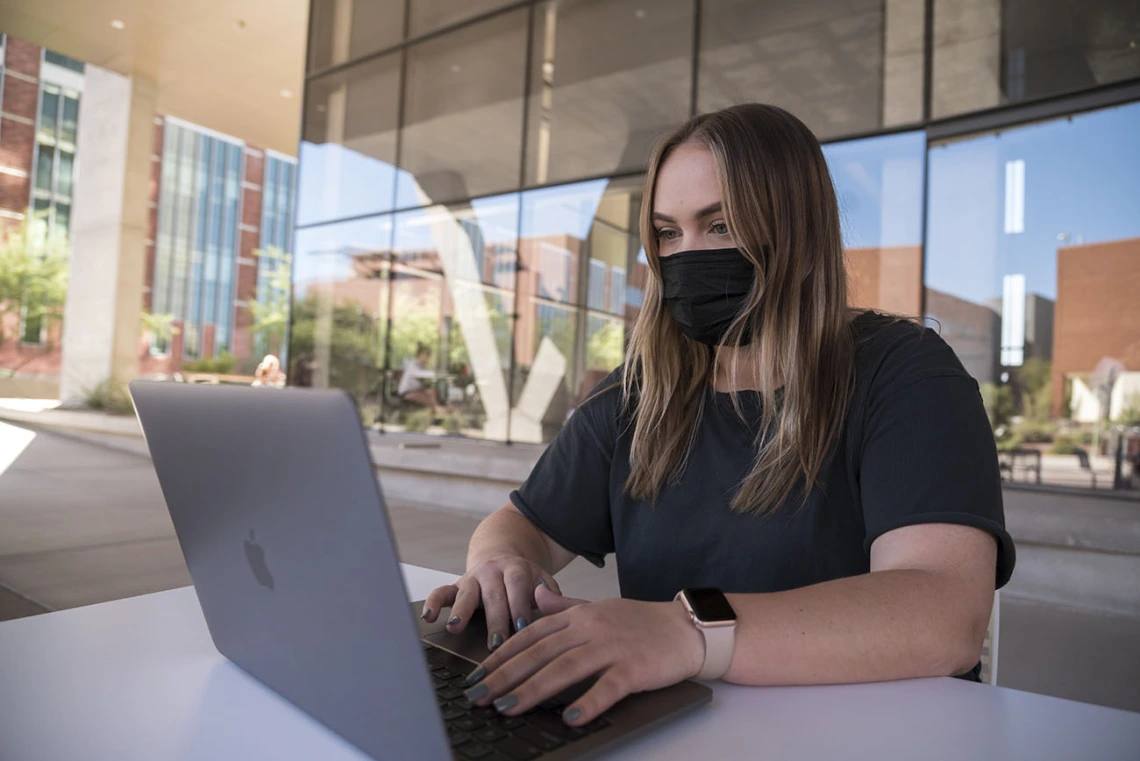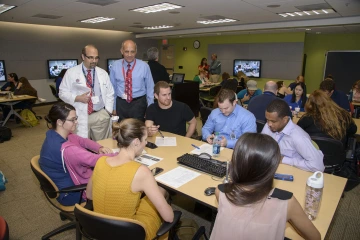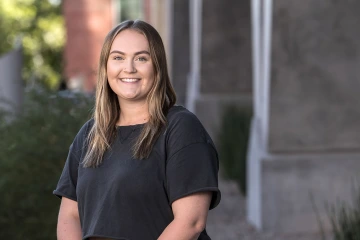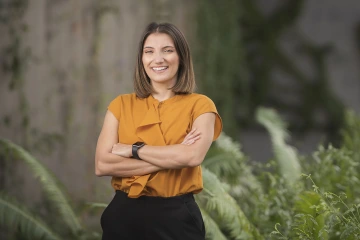Pandemic Provides Backdrop for Real-World Student Education
A recent COVID-19 interprofessional education exercise put lessons learned at the forefront and fostered collaboration for Health Sciences students.

The COVID-19 pandemic turned an annual interprofessional exercise into an opportunity for students to listen and ask questions as panelists shared personal stories from the pandemic.
The COVID-19 global pandemic continues to challenge the modern health care system in ways unimaginable a few years ago. Physicians, nurses, public health officials and other health care professionals have been called upon to serve their communities in unprecedented fashion.
If there is a silver lining, it is that these professions united to help mitigate the devasting effects of the pandemic. At the University of Arizona Health Sciences, these successful collaborations are being used to educate the next generation of health care professionals.

The hypothetical pandemic flu event, held in person in past years, has been a favorite interprofessional education activity for Health Sciences students. Organizers switched gears this year to focus on real-world lessons learned from the COVID-19 pandemic.
UArizona Health Sciences has been offering interprofessional education (IPE) exercises to its students for years. The events have brought together students from each of the five Health Sciences colleges: the College of Medicine – Phoenix, College of Medicine – Tucson, College of Nursing, Mel and Enid Zuckerman College of Public Health, and R. Ken Coit College of Pharmacy.
“Interprofessional education prepares students for a future in a patient-centered, collaborative team environment,” said Margie Arnett, director of the UArizona Health Sciences Center for Transformative Interprofessional Healthcare. “We offer a variety of interprofessional events, at which students learn about one another’s roles and responsibilities, effective communication, values and ethics, and mutual respect and trust, while discussing the topic and complex needs of a case.”
From hypothetical to real-world
One of the long-standing annual events has been a pandemic flu exercise that presented hypothetical scenarios to teams of students from various disciplines and colleges. The teams proposed solutions to problems that could be implemented for their scenario in the event of a future pandemic.
Amid an actual pandemic, Arnett and the organizers of this year’s IPE event switched gears. They redesigned it to serve as an informational exercise based on real-world experiences, using the expertise of a half-dozen Health Sciences panelists who selflessly served on the front lines.
“I really value what I can learn from these events to help me create a more collaborative environment when I am a doctor.”Sona Shahbazian
Ashley Cardin, RN, who graduated from the UArizona College of Nursing in 2019, was one of the panelists. She began her nursing career at Tucson Medical Center, and just a few short weeks after completing orientation, the pandemic hit. Nothing could not have prepared her for what followed.
“I’m the only person in the room with the patient, and I’m holding up an iPad so they can say goodbye to their loved ones,” Cardin said as she told her story to students participating via Zoom. “I burned out quickly.”
More than 700 students from UArizona, Arizona State University and Northern Arizona University joined one of two virtual COVID-19 IPE events in October. The students submitted nearly 500 questions and topics in advance of the event. The panelists reviewed the questions and focused their presentations on the topics of most interest.
“I was sitting there – just like you – for the pandemic flu exercise when I was a student,” Cardin said to the participants. “I never thought a pandemic would hit in our lifetime.”
Other panelists included Kristen Pogreba-Brown, PhD, assistant professor in the Zuckerman College of Public Health and member of the BIO5 Institute, Joe Gerald, MD, PhD, associate professor in the College of Public Health, Mona Arora, PhD, assistant research professor in the College of Public Health, Christopher Edwards, PharmD, BCPS, assistant professor in the R. Ken Coit College of Pharmacy, and Teresa Cullen, MD, clinical associate professor in the UArizona College of Medicine – Tucson.
Vaccines top the topics of conversation
When students submitted their questions, one topic was brought up more than any other: vaccines.
In March 2020, Dr. Gerald began producing a weekly Arizona COVID-19 Data Modeling Report, which has been an essential tool for data tracking and analysis throughout the pandemic. He shared current data and trends with the students while emphasizing the role that vaccines will have as COVID-19 becomes endemic in the years ahead.

More than 700 students participated in this year’s COVID-19 interprofessional education exercise, including Emilee Greer, a student at the Mel and Enid Zuckerman College of Public Health.
“My perspective is that everyone who does not get vaccinated will eventually be infected with COVID-19,” Dr. Gerald said. “Early on, there was a notion that we could achieve herd immunity if 65% to 85% of Americans were vaccinated. It is clear now that herd immunity is not achievable. Unfortunately, COVID-19 is not going away and it is imperative to get everyone vaccinated to avoid unnecessary hospitalizations and deaths.”
Emilee Greer, who is scheduled to graduate from the College of Public Health in May and plans to pursue a nursing degree, found Dr. Gerald’s insights significant, if not sobering.
“The visuals that he provided with the data stood out to me,” Greer said. “It’s easy to gloss over the fact we are still in a pandemic because we are back in class in person. But seeing the data was impactful because the pandemic is still with us.”
Greer was surprised to learn not all of her peers shared the opinion that vaccines should be mandated for health care workers. In an interactive poll, 25% did not favor a vaccine mandate.
Learning from each other
Sona Shahbazian, a first-year medical student at the College of Medicine – Tucson, approached the COVID-19 interprofessional exercise as an opportunity to learn how different health professionals communicate with and learn from each other.

Sona Shahbazian, a first-year student at the College of Medicine – Tucson, says she is looking forward to more events that foster interprofessional collaborations.
“We all learn about health in very different ways,” Shahbazian said. “For example, a pharmacy student has a wealth of knowledge that I can only scratch the surface of knowing on my own. A nursing student works intimately with patients in ways even doctors don’t interact. So, I really value what I can learn from these events to help me create a more collaborative environment when I am a doctor.”
Following the presentations from the panelists, students were assigned to breakout rooms that included a mix of students from various disciplines. Shahbazian’s room included students from pharmacy, nursing and nutritional science. Those interprofessional relationships may prove to be even more important than the lessons learned in the classroom for today’s Health Sciences students when they enter the workforce.
“I had my contacts in place before the pandemic hit,” Dr. Pogreba-Brown said as she related her pandemic experiences to students. “The last thing you want to do is have to make friends during an emergency.”
Contact
Blair Willis
520-626-2101
bmw23@arizona.edu

